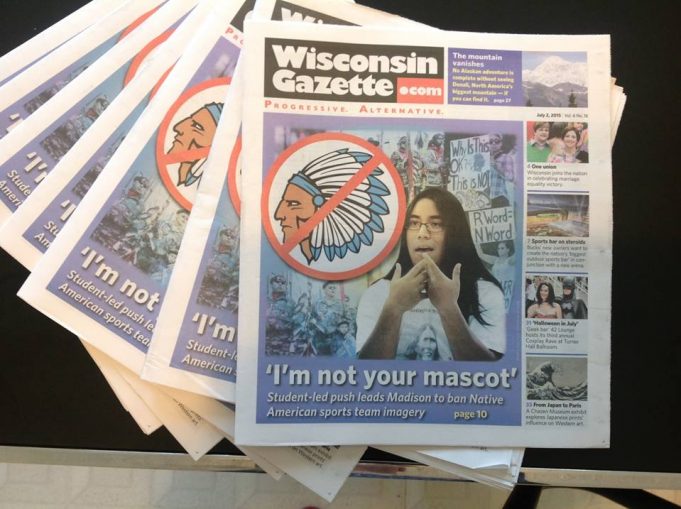In recent years, many daily newspapers and alternative print media across the United States have been struggling for survival or have ceased publication altogether. After nine years in business, the progressive alternative newspaper Wisconsin Gazette has printed its final issue.
The final “good-bye issue” was delivered to newsstands yesterday. Wisconsin Gazette’s website will continue through the election season in November.
“We’re closing the paper, but we’re leaving the company open. There’s still the potential to specialty publications sometimes. We just don’t know,” Louis Weisberg, Publisher and Editor-in-Chief of Wisconsin Gazette, tells Madison365. “I will continue writing and to write about the important issues we have been talk about. I’ll probably get more politically involved now, too.”

Over the years, the progressive, alternative paper became more and more popular peaking at a circulation of 32,000 in the Milwaukee and Madison areas not too long ago. The Milwaukee Press Club has recognized the Wisconsin Gazette with 31 awards since their first issue came out and the Association of Alternative Newsmedia recognized the newspaper with a first-place award for cover design and an “honor roll” designation for reporting.
Even with all of the accolades, the newspaper struggled to make money.
“There are a lot of forces working against print media right now. It’s not a conspiracy theory, it’s a fact,” Weisberg says. “Every force in the universe is aligned against print products. But without a free press, there cannot possibly be a democracy … because nobody is informed. It’s very troubling.”
The news organization is folding because its management does not foresee a sustainable future for the publication, Weisberg explained in its farewell column titled “So this is goodbye” writing:
Our readership has grown more than I ever imagined, and the accolades we’ve received from our peers have been numerous and humbling. The level of engagement we’ve had with readers has been extraordinary.
But we are an advertiser-supported medium, and it’s become clear that we cannot focus on putting out a quality newsprint publication in Milwaukee and hope to break even financially.
Wisconsin Gazette’s first issue came out on Nov. 19, 2009. The paper was founded as a news outlet serving Wisconsin’s LGBT community with a circulation of about 9,000.
“When the Onion went out of business, we bought their racks and their distribution sheet and we decided at some point that Milwaukee and the state weren’t going to support an LGBT paper and that’s when we branched out,” Weisberg remembers.
The Gazette expanded its mission as a progressive publication in 2014 and increased its distribution to 32,000 which included Madison. “We got great response from our readers,” Weisberg says. “I was Editor-in-Chief of two LGBT newspapers in Chicago and we never got the response like we did here from readers. People really liked the paper and were really engaged in it. We had a 90 percent pick-up rate in the Milwaukee area.”
But Weinberg says Wisconsin Gazette became a casualty of local ad agencies and that it was just impossible to find sales representatives. “It’s something that’s plaguing the whole industry,” Weisberg laments. “It’s a very hard thing to sell. Advertising agencies are telling all their people that print is dead.
“It isn’t dead. Actually, I think it’s a good purchase because there are fewer ads because yours stands out better,” he adds. “And with these papers, you are really reaching a niche audience. You’re reaching people who are picking it up because they really want to read the thing.”

Nevertheless, the hand-writing was on the wall. “We saw other great papers going out of business and it becomes a self-perpetuating prophecy,” Weisberg says. “People say print is dead, so it is. But it still exists. People still pick it up.”
But at the end of the day, agencies want click numbers and impressions numbers that print media couldn’t deliver. “They want numerical data and you can’t get that with a print product,” Weisberg says. “And because you can’t get that, they don’t want to mess with it.”
Wisconsin Gazette’s Facebook page actually attracted more engagements than that of any other non-daily print publication in the Milwaukee and Madison areas. Wisconsin Gazette’s Facebook page had more than 29,000 likes and plenty of daily engagement through its social media.
“The things that really made me angry about Facebook is that we have Donald Trump because of Facebook. Facebook is a place where people spread lies and their hate in the most uncivil ways possible,” Weisberg says. “It’s lead to a complete sea-change in the tone of our society.
“And, on top of that, they steal your information,” Weisberg adds, laughing. “It just doesn’t make any sense.”
Beyond Facebook, there have been some other significant changes in the newspaper industry that has happened in the last decade or so.
“The newspaper industry, in order to stay above water, they have to do events, they have to do conferences, they have to do “Best of” stuff. ‘Since you won, we’ll give you a half-off ad!’ It’s all fine, I guess. Do whatever you have to do to survive,” Weisberg continues. “But I didn’t want to do that and [Wisconsin Gazette CEO] Leonard [Sobczak] didn’t want to do it. We didn’t get into it for that. I’m 67 years old and I’ve been at this since I was in my late ‘20s.”
During its 9-year run, Wisconsin Gazette prided itself on writing about and investigating hard-hitting issues around LGBTQ equality, racial and economic justice, immigrant rights, women’s choice, a clean and sustainable environment, animal welfare, and more. As mentioned before, they won 31 total awards from the Milwaukee Press Club.
“We’re going to miss it a lot,” Weisberg says. “We weren’t doing this for money – we lost money every year – we were doing it to get these important issues that get buried out to people.”










